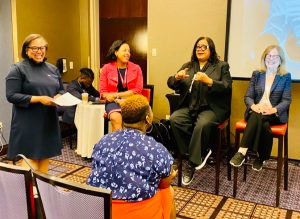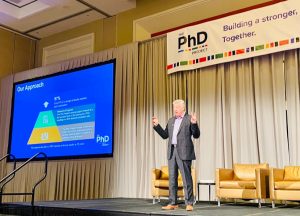Nonprofit works to increase diversity in college classrooms, business world
By Kevin Beese Staff Writer — March 20, 2024
Stephani Mason (left), an associate professor of accounting at DePaul University, smiles during a discussion at The PhD Project’s annual conference in Chicago. (Provided photo)
Stephani Mason was doing well for herself, working in finance for JPMorgan Chase, when she made the move to go into academia.
“Change is a daunting thing,” Mason said. “You go from a stable income and knowing what’s coming at you at every point of every day to going back in a classroom. I hadn’t been in a classroom in 15 years.”
Having her master of business administration degree in finance from the University of Chicago, Mason opted to go after her doctorate and got it with the help of The PhD Project.
A national nonprofit, The PhD Project works to increase diversity in the college classroom and the business world through mentorship.
Mason, who is Black, found the support and guidance through The PhD Project to get a doctorate degree in accounting from Rutgers University in New Jersey
Now an associate professor of accounting at DePaul University in Chicago, Mason is on the other end of The PhD Project, providing the support and guidance to help doctoral students and junior faculty.

Blane Rushak, president of The PhD Project, speaks at the nonprofit’s annual conference last year. (Provided photo)
“The beauty of The PhD Project is that people with a lot of work experience have a pathway to be a professor,” Mason said. “You can draw on your experience in the field. As an accounting professor, I draw on my experiences and relate it to what I’m teaching.
“When I step in the classroom to teach accounting or finance, I have the analysis for projects I did. Students can check the actual deals I did on Google and see how applicable my experience is.”
The PhD Project will gather for its 30th annual conference Thursday, March 21 and Friday, March 22 at the Hyatt Regency O’Hare Chicago in Rosemont.
Blane Ruschak, president of The PhD Project, said the annual conference is a great chance for individuals to learn if a college teaching profession is for them.
“We select 200-250 people per year to learn what a PhD is,” Ruschak said. “They learn that they have to do research and publish. They hear from 30-40 PhD Project members who talk about the investment and sacrifice it takes, and how to make it work for a family of three.”
Ruschak, who formerly was a recruiter for KPMG International, a global network of professional firms providing audit, tax and advisory services, said hiring diverse talent was always a goal of his.
“Every time, we would go to events and try to hire diverse talent, there would be none. I worked for KPMG’s Los Angeles office, and we would have few to none diverse hires,” Ruschak said. “The company threw money at it and there was no incremental increase.
“We looked at the issue and realized there were no diverse students to draw because there was no diverse faculty. A black student in business school could say, “I don’t see one person who looks like me on the faculty and go to a different major.”
Ruschak called the problem the role model effect.
“Schools that attract and hire a diverse faculty have more diverse students,” he said. “We believe diversity enriches us all. It provides better solutions in business.
“It is not just nice to have. Diverse teams come up with better ideas. Diverse business school talent creates a better business environment for everybody.”
DePaul’s Mason noted that most PhD programs no longer allow participants to work other jobs.
“It’s a full-time job in itself,” Mason said of doctoral programs. “From a grad assistant to a senior professor, it’s work. Most schools prohibit PhD candidates from working because doing both you don’t realize you would never eat or sleep.”
Mason advised anyone in underrepresented communities considering being a business school professor to go to www.phdproject.org.
“If you are thinking of being a business school professor, do it but do it with information,” Mason said. “Come to a conference. Learn what schools are looking for. Be armed with the best information.
“A success story doesn’t mean you always have success. It means you survived and made it to the other side. Most undergraduates are not thinking ‘How did this instructor get in front of the class?’ Find a role model and find out what teaching is all about.”
kbeese@chronicleillinois.com







